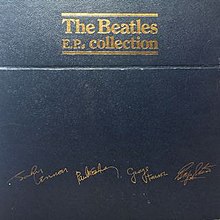
"Paperback Writer" is a song by the English rock band the Beatles. Written primarily by Paul McCartney and credited to the Lennon–McCartney partnership, the song was released as the A-side of their eleventh single in May 1966. It topped singles charts in the United Kingdom, the United States, Ireland, West Germany, Australia, New Zealand and Norway. On the US Billboard Hot 100, the song was at number one for two non-consecutive weeks, being interrupted by Frank Sinatra's "Strangers in the Night".

The Beatles' Story is the sixth album by the English rock band the Beatles in the United States, issued on 23 November 1964 by Capitol Records. It is a documentary double album featuring interviews, press conferences, and snippets of original or orchestral versions of Beatles songs, with voice-over narration. The album's original liner notes described it as a "narrative and musical biography" of Beatlemania. It was produced by Los Angeles–based songwriter and producer Gary Usher and disc jockey and lyricist Roger Christian, and narrated by John Babcock, Al Wiman and Christian.

"Blackbird" is a song by the English rock band the Beatles from their 1968 double album The Beatles. It was written by Paul McCartney and credited to Lennon–McCartney, and performed as a solo piece by McCartney. When discussing the song, McCartney has said that the lyrics were inspired by hearing the call of a blackbird in Rishikesh, India, and by racial tension in the Southern United States.
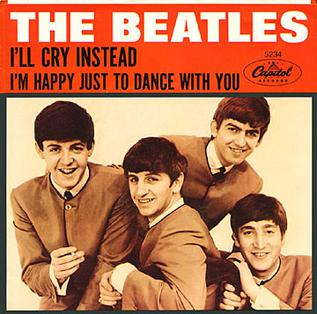
"I'll Cry Instead" is a song written by John Lennon, and recorded by the English rock band the Beatles for their third studio album, A Hard Day's Night (1964), a part-studio and part-soundtrack album to their film of the same name (1964). The song was released as a single in the US and later appeared on the album Something New in the US.
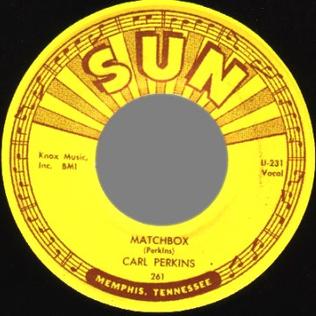
"Matchbox" is a song written and recorded by Carl Perkins and released in 1957. Blind Lemon Jefferson wrote and recorded a song entitled "Match Box Blues" in 1927, which is musically different but which contains some lyric phrases in common.
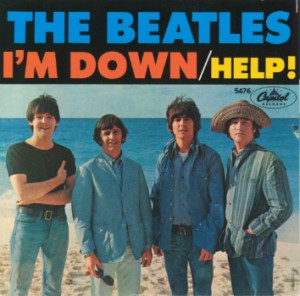
"I'm Down" is a song by the English rock band the Beatles, written by Paul McCartney and credited to Lennon–McCartney. It was released on a non-album single as the B-side to "Help!" in July 1965. The song originated in McCartney's attempt to write a song in the style of Little Richard, whose song "Long Tall Sally" the band regularly covered.
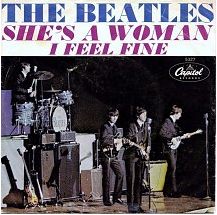
"She's a Woman" is a song by the English rock band the Beatles, written primarily by Paul McCartney and credited to Lennon–McCartney. It was released on a non-album single in November 1964 as the B-side to "I Feel Fine", except in North America, where it also appeared on the album Beatles '65, released in December 1964. Though it was the B-side, it charted in the US, reaching number four on the Billboard Hot 100 and number eight on the Cash Box Top 100. The song originated in McCartney's attempt to write a song in the style of Little Richard. The lyrics include the first reference to drugs in a Beatles song, with the line "turn(s) me on" referring to marijuana.
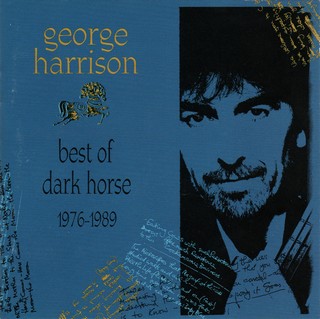
Best of Dark Horse 1976–1989 is a compilation album by English musician George Harrison, released in October 1989. His second compilation, after the Capitol/EMI collection The Best of George Harrison (1976), it contains songs from Harrison's releases on his Dark Horse record label between 1976 and 1987. The album also includes a 1989 single, "Cheer Down", which was Harrison's contribution to the soundtrack of the film Lethal Weapon 2, and two tracks recorded specifically for the collection: "Poor Little Girl" and "Cockamamie Business". Despite the popularity of Harrison's work over this period – both as a solo artist with his Cloud Nine album (1987), and as a member of the Traveling Wilburys – the compilation failed to achieve commercial success.

Yellow Submarine is the tenth studio album by English rock band the Beatles, released on 13 January 1969 in the United States and on 17 January in the United Kingdom. It is the soundtrack to the animated film of the same name, which premiered in London in July 1968. The album contains six songs by the Beatles, including four new songs and the previously released "Yellow Submarine" and "All You Need Is Love". The remainder of the album is a re-recording of the film's orchestral soundtrack by the band's producer, George Martin.

The Beatles Box Set is a sixteen-disc box set compiling the entire recorded works of the Beatles as issued by the band between 1962 and 1970. It was released on 15 November 1988 in Britain and America, with the same catalogue number in each of those countries. While available also in vinyl LP and cassette formats, the box set was the first complete collection of original Beatles material to be released by EMI and Capitol Records on compact disc.

Por Siempre Beatles is a compilation album by the English rock group the Beatles, released in 1971 in Spain and Latin America. It contains various songs from 1965 to 1968 that had not appeared on a British studio album by the Beatles.
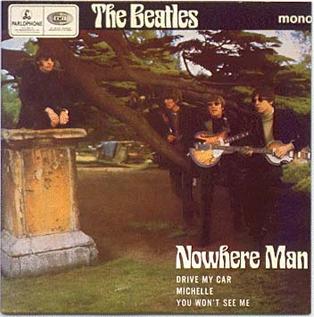
Nowhere Man is the 12th extended play (EP) by the English rock band the Beatles. It was released on 8 July 1966. It includes four songs from their album Rubber Soul, which had been released in December 1965. The EP was only issued in mono, with the Parlophone catalogue number GEP 8952.
Alan W. Pollack is an American musicologist best known for having analyzed every song released by the English rock band the Beatles.

The Music of Lennon & McCartney is a 1965 British television special honouring the Lennon–McCartney songwriting partnership of John Lennon and Paul McCartney of the English rock band the Beatles. It was produced by Granada Television and aired on that station on 16 December 1965 before receiving a national broadcast across the entire ITV network, of which Granada was a part, the following evening. The programme mainly consisted of other artists miming to their recordings of Lennon–McCartney songs, interspersed with scripted commentary from Lennon and McCartney. In addition, the Beatles performed both sides of their current single, "Day Tripper" and "We Can Work It Out". Peter Sellers performed a comedic interpretation of "A Hard Day's Night", in the style of stage actor Laurence Olivier's portrayal of Richard III.
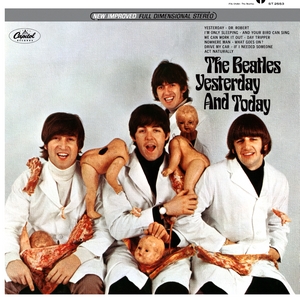
Yesterday and Today is a studio album by the English rock band the Beatles. Released in the United States and Canada in June 1966, it was their ninth album issued on Capitol Records and twelfth American release overall. Typical of the Beatles' North American discography until 1967, the album contains songs that Capitol had withheld from its configurations of the band's recent EMI albums, along with songs that the group had released elsewhere on non-album singles. Among its 11 tracks are songs from the EMI albums Help! and Rubber Soul, and three new 1966 recordings that would appear on Revolver in countries outside North America.

The Beatles Box is an eight-record box set of Beatles recordings, initially released on 3 November 1980 by World Records, a mail-order subsidiary of EMI. It was also issued in two formats by Reader's Digest in New Zealand, Australia and Mexico.
Wings Over the World is a 1979 television music documentary film featuring the rock band Wings. It consists of concert performances from their acclaimed Wings Over the World tour of 1975-1976, together with behind-the-scenes footage. Also included is a short excerpt of Wings rehearsing at London's Institute of Contemporary Arts before their 1972 UK university tour. Problems with the audio from the 1976 live performances delayed the film's release until 16 March 1979 in the United States and 8 April 1979 in the United Kingdom, by which time, band members Jimmy McCulloch and Joe English had left the group and been replaced.

The Love You Make: An Insider's Story of the Beatles is a 1983 book by Peter Brown and Steven Gaines. Brown was personal assistant to the Beatles' manager, Brian Epstein, a senior executive at Apple Corps, as well as best man to John Lennon at the latter's wedding to Yoko Ono in March 1969.

The Singles Collection 1962–1970 is a series of reissued singles by the English rock band the Beatles. It was released in Britain on 5 March 1976 by EMI, following the expiration of the Beatles' contract with the company in January, and close to six years after the band's break-up. The collection comprises all 22 of the Beatles' UK singles, which were originally issued between October 1962 and March 1970 on either the Parlophone or Apple record labels, together with a new single pairing "Yesterday" with "I Should Have Known Better".
